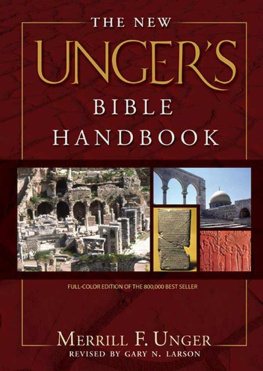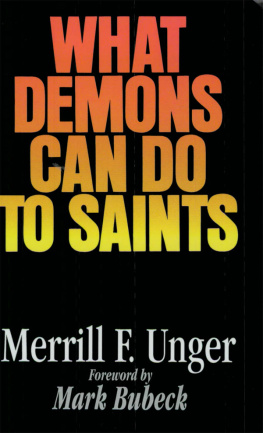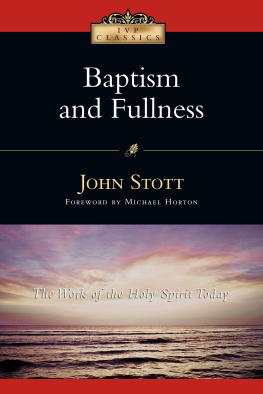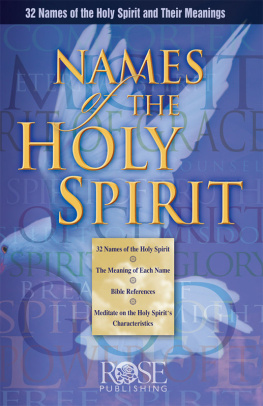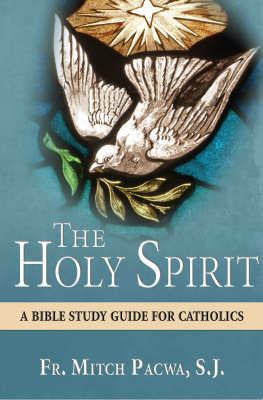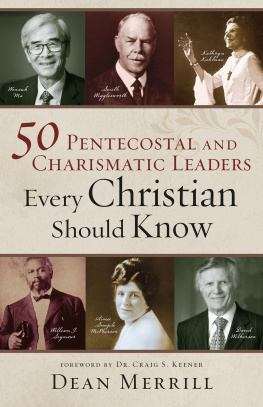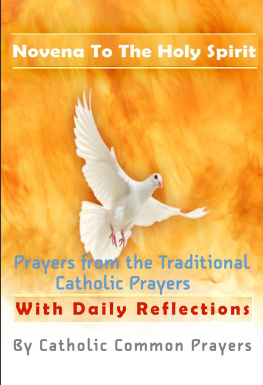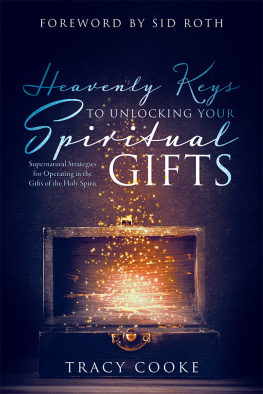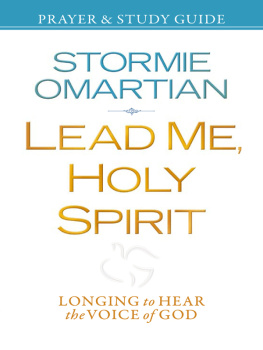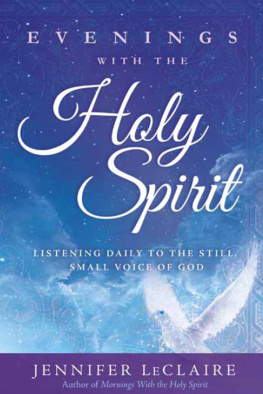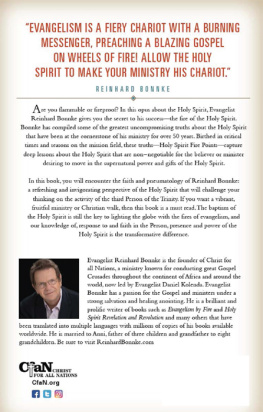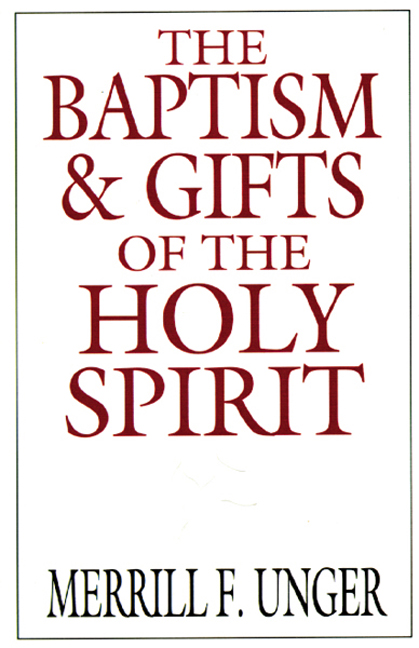THE
BAPTISM
& GIFTS
OF THE
HOLY
SPIRIT
MERRILL F. UNGER
MOODY PRESS
CHICAGO
1974 by
T HE M OODY B IBLE I NSTITUTE
OF C HICAGO
All rights reserved. No part of this book may be reproduced
in any manner whatsoever without written permission except
in the case of brief quotations embodied in critical articles or brief reviews.
Selected references from the New American Standard Bible
are used by permission of The Lockman Foundation, 1960, 1962, 1963, 1971, 1973.
Library of Congress Catalog Card Number: 74-2931
ISBN: 0-8024-0467-7
21 23 25 27 29 30 28 26 24 22
Printed in the United States of America
Contents
CHAPTER
The Baptism of the Spirit in Charismatic Christianity
O NE OF THE MOST NOTEWORTHY features of twentieth-century Christianity is the rise of a strong charismatic movement within the church. Appearing in various forms, this species of revivalism has one common basic element. It highlights the baptism of the Spirit, which it construes as an experience of power subsequent to salvation and maintains the evidence of this experience is speaking in tongues.
By tongues, glossolalists usually mean genuine languages never learned but supernaturally spoken. Some, however, hold to the tenuous theory of an unknown tongue. This is imagined to be a special ecstatic utterance of the Spirit, not translatable and not understandable by men. In any case, aside from the nature of the phenomenon, such a manifestation is called a charisma (from the Greek charisma, a gift), denoting an extraordinary power possessed by some of the early Christians.
Hence the term charismatic refers to such charismata as miracles of healing and supernatural utterance in languages. Such charismata, of course, took place in the apostolic church. Present-day charismatic revivalism holds that the same manifestations of the Spirit that appeared in the first century ought to be manifested today.
Moreover, charismatic Christians contend that such manifestations do take place today when believers receive the baptism of the Spirit and the power it professedly brings with it.
T HE R ISE OF C HARISMATIC C HRISTIANITY
1. Pentecostalism has its roots in early Methodism of the eighteenth century and the revivalism of Charles G. Finney in the first half of the nineteenth century.
Eighteenth-century Methodism, as Frederick Dale Bruner correctly points out, is the mother of the nineteenth-century American holiness movement which, in turn, bore twentieth-century Pentecostalism. By laying special emphasis upon such an instantaneous experience of sanctification subsequent to regeneration, Wesley preveniently prepared the way for the Pentecostal concept of a crisis and conscious experience of the baptism of the Holy Spirit following conversion.
American revivalism of the nineteenth century, particularly as exemplified in the doctrine and methods of Charles G. Finney (1792-1876), exerted a wide influence in shaping American Christianity and in turn became the major historical bridge between early Methodism and modern Pentecostalism.
Finneys theology embraced an experience subsequent to conversion which he styled the baptism of the Holy Spirit. His one-volume systematic theology is widely used today in Pentecostal circles and considered standard by the average Pentecostal evangelist and pastor.
However, even more influential on American Christianity than Finneys theology were his revival methods. These were purposely emotional and geared to high excitement. Finney justified his approach to bringing people to a spiritual crisis by the belief that men are so sluggish. There are so many things to lead their minds off from religion and to oppose the influence of the gospel that it is necessary to raise an excitement among them till the tide rises so high as to sweep away the opposing obstacles.
By the middle of the nineteenth century, Finneys theologywhich was essentially Methodismhis highly emotional revivalism had been transformed from a minority to a majority faith, to become, as McGloughlin points out, the national religion This meant that Finneys teaching of a spiritual baptism subsequent to conversion and his encouragement of high emotionalism in revival methodology had become prominent features of American Christianity. Both of these elements were later to find a permanent place in the Pentecostal movement of the twentieth century.
2. Pentecostalism developed out of the holiness movement of the latter half of the nineteenth century.
This second-blessing holiness phenomenon was largely Methodistled by Methodists and appealing mainly to Methodists. It was the outgrowth of the dissatisfaction of many within Methodist churches with the worldliness of the church as a whole and the lack of adherence to the Wesleyan doctrine of perfection.
The holiness movement, in loyalty to its Wesleyan heritage, found its theological center in a second experience after conversion. This was often dubbed by different terms: a pure heart, sanctification, perfection, or perfect love. But by whatever terminology it was called, it assured the so-called subsequent experience an importance it was later to assume in Pentecostalism.
In the holiness movement the phrase the baptism of the Holy Spiritwhich was destined to have such wide significance in Pentecostal teachingas the Pentecostal historian Kendrick confesses, was popularized as the name for the experience of sanctification or second blessing. All who came under the Holiness ministry became familiar with spiritual baptism.
One of the chief protagonists of the holiness movement, W. E. Boardman, succinctly epitomized broad holiness principles as they later came to undergird distinctive Pentecostal tenets, when he wrote, There is a second experience distinct from the firstsometimes years after the firsta second conversion, as it is called.
Coming into existence in America, the second-blessing holiness
3. Pentecostalism gained support and the cloak of doctrinal respectability as the result of the unprecise teaching concerning the Holy Spirit of a number of prominent Evangelicals of the late nineteenth and early twentieth century.
These widely respected leaders, apparently influenced by the nineteenth-century holiness theology with its lack of doctrinal precision, taught the later distinctively Pentecostal tenet of the baptism of the Spirit as an experience subsequent to salvation. Foremost among these conservatives were F. B. Meyer, A. J. Gordon, A. B. Simpson, Andrew Murray, and most significant of all, R. A. Torrey.
Torrey may be said to be the one non-Pentecostal leader who, after Wesley and Finney, was the most influential in the prehistory of Pentecostalism. He gave the greatest impetus to the establishment of the movement as doctrinally respectable and experientially sound.
Although all of the evangelicals contemporary with the rise of Pentecostalism, who taught second-experience theology, constitute a kind of theological reservoir from which Pentecostals have drawn heavily to establish their central tenet of the baptism of the Spirit, none is quoted more frequently or more approvingly than R. A. Torrey, a non-Pentecostal.
The statement of Torrey most often quoted by Pentecostals to bolster their position on the baptism of the Spirit claims that regeneration by the Spirit and baptism with the Spirit do not occur at the same time. The baptism of the Holy Spirit is an operation of the Holy Spirit distinct from and subsequent and additional to His regenerating work.


